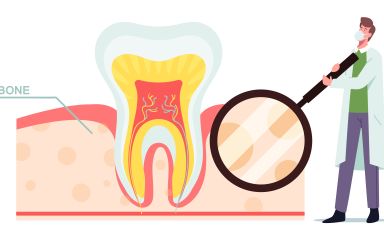
Some patients wonder if dental implants are the best choice for their missing teeth. The time and effort dental implants take can be off-putting to some patients. If you’re wondering if dental implants are really worth it, there are many factors for you to consider.
Dental implant treatment takes a relatively long period of time to complete as well as to completely heal when compared to other tooth replacement options, such as a bridge. The planning process is far more involved than in other missing tooth replacement plans. The materials utilized with dental implants take more time to create in a dental lab and require greater skill and attention than other lab-created tooth replacements.
Dental implants are much stronger than other tooth replacement options, and will last years or even decades longer. When compared to a dental bridge which lasts an average of 14 years, a dental implant can last up to 30 years.
Sometimes, if insufficient bone is present to provide the necessary support for the implant, bone from elsewhere in the body might be grafted onto the existing bone. A dental implant must heal completely before any pressure is put on the new artificial tooth roots. This can take up to three months. After this time, the tooth portion of the dental implant is applied.
Dental implants are the strongest, best choice for a patient with a missing tooth. They rarely fracture and never decay. As opposed to a dental bridge that necessitates the removal of some of your natural tooth structure, a dental implant preserves adjacent teeth and allows patients the most natural, ideal choice for tooth replacement.
Dental implant candidates who are willing to be patient and plan for the future can experience the benefits these restorations have to offer. Talk to your dentist if you want to explore your options for replacing one or more missing teeth.
We look forward to seeing you in our Meriden dental office

The Impact of Missing Teeth on an Individual’s Life
Losing teeth can have a significant impact on an individual’s life. It can affect their self-esteem, oral health, and overall quality of life. For some people, missing teeth may seem like a cosmetic problem that they can simply live with.
However, it is crucial to understand that missing teeth can lead to a range of dental issues, including gum disease and bone loss. Additionally, individuals with missing teeth may feel embarrassed or self-conscious about their appearance.
They may avoid social situations or activities that require them to interact with other people due to their perceived flaws. Furthermore, the inability to eat certain foods comfortably or effectively can impact one’s nutrition and overall health.
Dental Implants as a Solution to Missing Teeth
Fortunately, dental implants are an effective solution for individuals with missing teeth. Dental implants are artificial tooth roots that are surgically placed into the jawbone.
They provide a stable base for replacement teeth such as crowns or dentures. One of the advantages of dental implants is that they look and function like natural teeth.
They blend seamlessly with existing teeth and help restore one’s smile. Moreover, because dental implants integrate with the jawbone over time, they prevent bone loss in the area where they are placed.
Another benefit of dental implants is that they require minimal maintenance compared to other tooth replacement options such as dentures or bridges. With proper care, dental implants can last for many years without needing replacement.
Losing one or more teeth has a significant impact on an individual’s life beyond just appearance-related issues and should not be ignored over time. Dental implants provide numerous benefits in terms of aesthetics and functionality which contribute positively towards quality living after tooth loss cases through simple surgical procedure placement techniques administered by professionals such as periodontists and oral surgeons.
The Benefits of Dental Implants
Improved Appearance and Confidence
Missing teeth can have a damaging effect on an individual’s appearance and self-confidence. With dental implants, patients can restore their natural-looking smile, making them feel more confident in social situations. Dental implants are custom-made to match the size, shape, and color of existing teeth, so they look and feel natural.
The Psychological Impact of Having a Complete Set of Teeth
Along with improving appearance and confidence, dental implants can have a significant psychological impact on individuals. People with missing teeth often feel embarrassed or ashamed when smiling or speaking in public. Dental implants give patients the ability to speak and smile confidently without worrying about their missing teeth.
Better Oral Health
Missing teeth can lead to oral health problems such as bone loss and gum disease. When a tooth is missing, the jawbone that supported it will start to deteriorate over time.
This can lead to further tooth loss as well as changes in facial structure. Dental implants prevent bone loss by stimulating the jawbone just like natural teeth do.
How Dental Implants Can Prevent Bone Loss and Gum Disease
Unlike other tooth replacement options such as bridges or dentures that sit on top of the gums, dental implants are surgically placed into the jawbone where they fuse with the bone over time. This process is called osseointegration and helps prevent bone loss by providing stimulation to the bone just like natural teeth do.
Comparison with Other Tooth Replacement Options
While there are other tooth replacement options available such as bridges or dentures, dental implants are often considered superior due to their durability, convenience, functionality, comfortability, natural appearance/confidence-restoring ability among other benefits compared to these alternatives. : Dental implants offer numerous benefits for individuals dealing with missing teeth, including increased confidence, better oral health, and a natural-looking smile. When compared to other tooth replacement options, dental implants are often the preferred choice due to their long-term durability and functionality.
The Dental Implant Procedure
Consultation and Examination Process
Before undergoing any dental implant procedure, patients must first undergo a thorough consultation and examination process. During this process, the dentist will evaluate the patient’s oral health condition to determine whether dental implants are a viable solution.
This includes reviewing the medical history of the patient, conducting a comprehensive dental exam, and taking X-rays or CT scans of the mouth. The dentist will also discuss with the patient their expectations for the procedure.
Evaluation of Patient’s Oral Health Condition
The evaluation of a patient’s oral health condition is crucial in determining whether they are eligible for dental implants. Factors such as gum disease or bone loss can complicate or prevent successful implant placement. The dentist may recommend additional treatments to prepare the mouth for implant surgery such as bone grafting or periodontal therapy.
Discussion on Best Implant Option for Patient
Once it has been determined that a patient is eligible for dental implants, the next step is discussing which implant option is best suited to their unique needs. There are several different types of dental implants available, including traditional endosteal implants and zygomatic implants designed for patients with significant bone loss. Factors such as jawbone density and location of missing teeth will be taken into consideration when selecting an appropriate implant option.
Implant Placement Procedure
Preparation for surgery begins with administering local anesthesia to numb the area where the implant will be placed. In some cases, sedation dentistry may be used to help anxious patients relax during surgery. Once asleep or comfortable from anesthesia, The surgeon then makes an incision in the gum tissue to access the jawbone beneath it where they carefully drill holes into bone tissue then surgically attach titanium posts
The Surgical Process Itself
During surgery, the dental implant is surgically placed into the jawbone beneath the gum tissue. The procedure typically takes several hours to complete and may involve multiple implant placements. After surgery, patients are typically sent home to rest and recover.
Post-operative Care
Recovery from dental implant surgery varies depending on the individual patient, but generally involves some swelling and discomfort for a few days following the procedure. During this time, it is important to follow all post-operative care instructions provided by the dentist or surgeon.
This includes taking any prescribed medications, avoiding certain foods and drinks, and practicing good oral hygiene habits. Patients will be asked to schedule a follow-up appointment with their dentist or surgeon in order to monitor healing progress and ensure proper integration of the dental implants into the jawbone.
The Cost and Maintenance of Dental Implants
Cost Comparison with Other Tooth Replacement Options
When considering the cost of dental implants, it is important to compare them with the cost of other tooth replacement options. While dental implants may seem more expensive at first glance, they are often more cost-effective in the long run.
Dentures and bridges may need to be replaced over time, whereas dental implants can last a lifetime with proper care. Additionally, dental implants provide many benefits that other tooth replacement options do not, such as improved oral health and a natural-looking appearance.
Maintenance Requirements for Dental Implants
Proper maintenance is crucial for ensuring the longevity and effectiveness of dental implants. While dental implants are not subject to decay like natural teeth, they still require regular maintenance to prevent complications. This includes daily brushing and flossing, as well as regular visits to the dentist for cleanings and check-ups.
Patients should also avoid chewing on hard objects or using their teeth as tools, as this can damage both natural teeth and dental implants. By following these guidelines, patients can ensure their dental implants remain strong and healthy for years to come.
Frequently Asked Questions About Dental Implants
Common Concerns About the Procedure
One of the most common concerns regarding dental implants is the pain associated with the procedure. Patients often wonder about the level of discomfort they may experience during and after surgery.
However, it is important to note that modern dentistry has come a long way. The use of local anesthesia, sedation, or general anesthesia can make the procedure relatively painless.
Most patients report minimal discomfort during and after implant placement. Another common concern is the length of time required for healing and integration of implants into the jawbone.
Patients typically have to wait for 4 to 6 months before they receive their new teeth on top of their implants. This waiting period allows for adequate osseointegration or fusion between bone and implant.
Answers to Frequently Asked Questions
One frequently asked question from patients is whether dental implants are safe. According to studies, dental implants have a high success rate, ranging from 95%-98%.
However, as with any surgical procedure, there are risks involved such as infection or implant failure. Patients also want to know if dental insurance covers implant procedures.
While some insurance companies offer coverage on a case-by-case basis, most plans consider dental implants as an elective cosmetic treatment that does not qualify for coverage. Another question commonly asked by patients concerns maintenance requirements for implanted teeth.
Patients should brush and floss daily just like they would natural teeth and visit their dentist regularly for check-ups and cleanings. Overall, it’s essential to consult with a qualified dentist who can guide you through any questions or concerns you may have regarding dental implant placement.
Patient Testimonials: Real-Life Stories About Life-Changing Results from Dental Implants
From Social Anxiety to Self-Confidence
Liz, a 32-year-old marketing executive, had been struggling with social anxiety for years due to her missing front teeth. She felt self-conscious and afraid to smile or speak in public, which made it difficult for her to advance in her career. After receiving dental implants, Liz felt like a new person.
She was no longer ashamed of her teeth and could confidently interact with others without fear of judgment. Her career took off, and she even started dating again.
Regaining the Ability to Enjoy Food
John had been struggling with missing teeth for years, making it challenging for him to enjoy his favorite foods. He was unable to chew properly and often experienced discomfort while eating.
After getting dental implants, John was finally able to eat all the foods he loved without pain or difficulty. He could now enjoy social gatherings that revolved around food and found himself looking forward to meals once again.
Improved Overall Health
Sandra had lost several teeth due to gum disease and was experiencing bone loss in her jaw as a result. This made it difficult for her dentures to fit correctly and caused discomfort while eating or speaking.
After getting dental implants, Sandra’s jawbone density improved significantly, allowing her dentures to fit more comfortably than ever before. She also saw an improvement in overall health as gum disease became less of a concern.
A New Lease on Life
Michael had been struggling with missing teeth for many years before taking the leap towards dental implants. At first hesitant about the procedure due to cost concerns, Michael eventually decided that the benefits outweighed any downsides. After receiving his implants, Michael felt like he had been given a new lease on life.
He was no longer self-conscious about his smile and could confidently interact with others without fear of judgment. Michael even began pursuing new hobbies and interests that he had previously avoided due to his lack of confidence.
The Power of Dental Implants
These patient testimonials show just how life-changing dental implants can be for those struggling with missing teeth. From boosting self-confidence to improving overall health, dental implants provide a permanent solution that can drastically improve the quality of life for those in need. If you or someone you know is struggling with missing teeth, consider exploring the many benefits that dental implants have to offer.
Why Missing Teeth Should Not Be Ignored, And Why
The Importance of Addressing Missing Teeth
Missing teeth can have a profound impact on an individual’s quality of life. It can lead to psychological distress, self-esteem issues, and difficulty in performing basic functions such as speaking and eating. This is why it is crucial to address missing teeth as soon as possible to prevent further damage and complications.
Dental Implants As The Solution
Dental implants have revolutionized the way we address missing teeth. They provide a permanent solution that restores the function and appearance of natural teeth. With proper care, dental implants can last for many years, making them a valuable investment in your oral health.
The Future of Dental Implants
As technology continues to advance, we can expect even more improvements in dental implant procedures. From 3D imaging to digital planning tools, these advancements will make the process even more efficient and effective. Furthermore, dental implant materials will continue to improve over time, leading to even better results.
Missing teeth should not be ignored or dismissed as a minor issue. It can greatly impact an individual’s overall well-being and quality of life.
Dental implants provide a solution that not only restores functionality but also improves aesthetics and self-confidence. With proper care and maintenance, they can last for many years and offer long-term benefits for your oral health.
Are dental issues holding you back? Take control of your oral health by booking an appointment with our experienced team at our Meriden dental office.

Dental Implants
Dental implants are artificial tooth roots that provide a permanent base for fixed or removable replacement teeth. They are an essential part of restorative dentistry and have transformed many people’s lives by returning their ability to speak, eat, and smile confidently.
Dental implants offer several benefits over other tooth replacement options such as bridges or dentures. In this article, we will explore the advantages of dental implants, the types available, the procedure for getting them, misconceptions associated with dental implants and why they are better than any other tooth replacement option.
Advantages of Dental Implants
Dental implants have become an increasingly popular solution for missing or damaged teeth. Not only do they provide a long-lasting replacement option, but they also offer a range of other benefits that make them a far superior choice compared to traditional options such as bridges or dentures. Here are some of the main advantages:
Improved Appearance and Confidence
The most obvious advantage of dental implants is that they can significantly improve the appearance of your smile. Missing teeth can cause embarrassment and discomfort, leading to low self-confidence.
Dental implants seamlessly blend in with your natural teeth, resulting in a more attractive and youthful appearance. Additionally, unlike other options, dental implants prevent bone loss and maintain facial structure by stimulating natural bone growth.
Enhanced Oral Health and Functionality
Dental implants are designed to mimic the function of natural teeth. This means that they restore full biting force and allow you to eat all types of food without any discomfort or restriction. Moreover, dental implants support neighboring teeth and reduce the risk of cavities or gum disease caused by decayed or infected roots.
Longevity and Durability
Dental implants are one of the most durable tooth replacement options available today. Their ability to fuse with the jawbone ensures that they remain securely in place for decades if properly cared for. Unlike traditional tooth replacements such as bridges, which require replacement every five to ten years, dental implants have been known to last a lifetime.
Convenience and Comfort
Dental implant surgery is minimally invasive compared to other dental surgeries such as root canals or extractions. Patients undergoing dental implant procedures report little pain during recovery, leading to minimal disruption in their daily lives post-surgery. Dental implants offer a range of benefits making them the ideal solution for those seeking a long-lasting, functional, and aesthetically pleasing tooth replacement option.
The Dental Implant Procedure
Initial Consultation and Examination
The dental implant procedure begins with a consultation and examination with your dentist. During this appointment, your dentist will evaluate your oral health, take X-rays or CT scans of your mouth, and discuss any concerns or questions you may have about getting dental implants. Your dentist will also review your medical history to ensure that you are a good candidate for the procedure.
Preparatory Procedures such as Bone Grafting or Sinus Lifts
If necessary, preparatory procedures may be required before the actual placement of the dental implant. For example, if you do not have enough bone density in your jaw to support an implant, a bone grafting procedure may be necessary to build up the area.
Similarly, if the sinuses are too close to where the implants will be placed, a sinus lift may be required. These preparatory procedures can help ensure that the implants have sufficient support for proper fusion with the jawbone during healing.
Placement of Dental Implant
Once any preparatory procedures are complete and you are deemed ready for dental implant placement, it is time for surgery. The actual placement of dental implants involves making an incision in the gum tissue to expose the jawbone underneath.
A small hole is then drilled into this bone where an anchor post is inserted into it. After this post has been set into place, a temporary crown or bridge is attached while osseointegration occurs.
Healing Process and Osseointegration
The healing process after implant placement can take several months as osseointegration occurs. During this process, the implant anchors fuse with surrounding bone tissue which provides stability for long-term usage. Ossification happens gradually over time as new bone tissue surrounds each anchor post connecting it securely through out life.
It is important to follow all of your dentist’s instructions for aftercare during this period, including proper oral hygiene practices and any dietary restrictions that may be necessary. Once the process of osseointegration is complete, you will be able to return to your dentist for placement of a permanent crown or bridge on top of the implant posts.
Care and Maintenance of Dental Implants
Proper Oral Hygiene Practices
After the dental implant surgery, it is essential to maintain good oral hygiene to prevent any risk of infection. As with natural teeth, brushing twice a day with a soft-bristled toothbrush and fluoride toothpaste is necessary.
Flossing at least once daily can remove any food particles or plaque that may accumulate around the implants. In addition to daily brushing and flossing, it is recommended to use an antibacterial mouthwash to rinse the mouth thoroughly.
Regular Check-ups with the Dentist
Regular visits to the dentist are imperative for maintaining good oral hygiene after dental implant surgery. The dentist will monitor the implants’ health by inspecting them during routine check-ups, cleaning them professionally, and assessing bone density around them. The hygienist will also clean and polish the implants using ultrasonic scalers or hand instruments if any plaque accumulation occurs around them.
During these follow-up appointments, X-rays may be taken periodically to ensure that there are no issues developing under the surface of the gums that cannot be seen by visual inspection alone. Your dentist may also recommend specific oral hygiene techniques or products tailored specifically for your implant’s needs.
It is essential to keep up with regular appointments as some complications relating to dental implants can arise without symptoms such as peri-implantitis (inflammation or infection of gum tissue around an implant), which can result in bone loss if left untreated. Proper oral hygiene practices such as regular brushing and flossing alongside antibacterial mouthwash use are crucial for maintaining excellent dental implant health while regular check-ups with your dentist can help identify potential problems before they become severe issues.
Common Misconceptions about Dental Implants
There are several misconceptions about dental implants that cause some people to shy away from this excellent tooth replacement option. Here we will tackle three of the most common:
Costly Treatment Option
Dental implants have a reputation for being expensive, and in many cases, they can be more costly than other options such as bridges or dentures. However, it’s important to consider the long-term benefits of dental implants.
Unlike bridges or dentures that may need to be replaced after a few years, dental implants can last a lifetime when properly cared for. In addition, dental implants can improve oral health and prevent further damage and expenses down the line.
Painful Procedure
The idea of having screws drilled into your jawbone may sound painful and intimidating. However, with modern technology and sedation options, getting dental implants is generally not painful at all.
Patients report feeling only mild discomfort during the procedure and manageable soreness afterward that can be relieved with over-the-counter pain medication. Your dentist will work with you to ensure your comfort throughout the entire process.
High Risk of Failure
Some people believe that dental implant surgery has a high risk of failure or complications. While there is always some degree of risk involved in any surgical procedure, including dental implant placement, success rates are very high – between 95-98%.
Proper care and maintenance contribute significantly to the success rate as well as choosing an experienced professional who uses quality materials.
Why Dental Implants are Better Than Other Options
Comparison with other tooth replacement options such as bridges or dentures.
When comparing dental implants to other tooth replacement options like bridges or dentures, there are undeniable advantages that make the former a better option. One of the biggest drawbacks of traditional methods like bridges is that they require grinding down healthy teeth and placing crowns on them, which can weaken them in the long term. Moreover, it can be difficult to clean underneath bridges, which can lead to decay and gum disease.
Dentures, on the other hand, have a notorious reputation for being uncomfortable and slipping out of place. They also tend to cause bone loss in the jaw over time, which can change your facial structure.
Recapitulation of the advantages, types, procedure, care, maintenance, misconceptions.
Dental implants are a superior tooth replacement option due to their numerous benefits like improved appearance and confidence, enhanced oral health and functionality (including speech), longevity and durability (they can last for decades), convenience and comfort (since they feel just like real teeth). There are also different types of dental implants available including endosteal implants (which are placed in the jawbone), subperiosteal implants (which sit under the gum but above the jawbone) and zygomatic implants (which anchor onto cheekbones when there isn’t enough bone in the upper jaw).
The implant procedure involves an initial consultation/examination followed by preparatory procedures if necessary like bone grafting or sinus lifts. Then comes implant placement itself followed by a healing process known as osseointegration.
Maintenance involves proper oral hygiene practices along with regular check-ups with your dentist to ensure everything is functioning properly. common misconceptions including high costs (which may not be as much compared to other treatments in long-run), painful procedure (which can be easily managed with anesthesia) and high risk of failure (which is rare when the right precautions are taken).
Do not wait any longer. Book your appointment now and achieve the smile you have always wanted. Dr. Hergott is accepting new patients from Meriden and the surrounding area.














